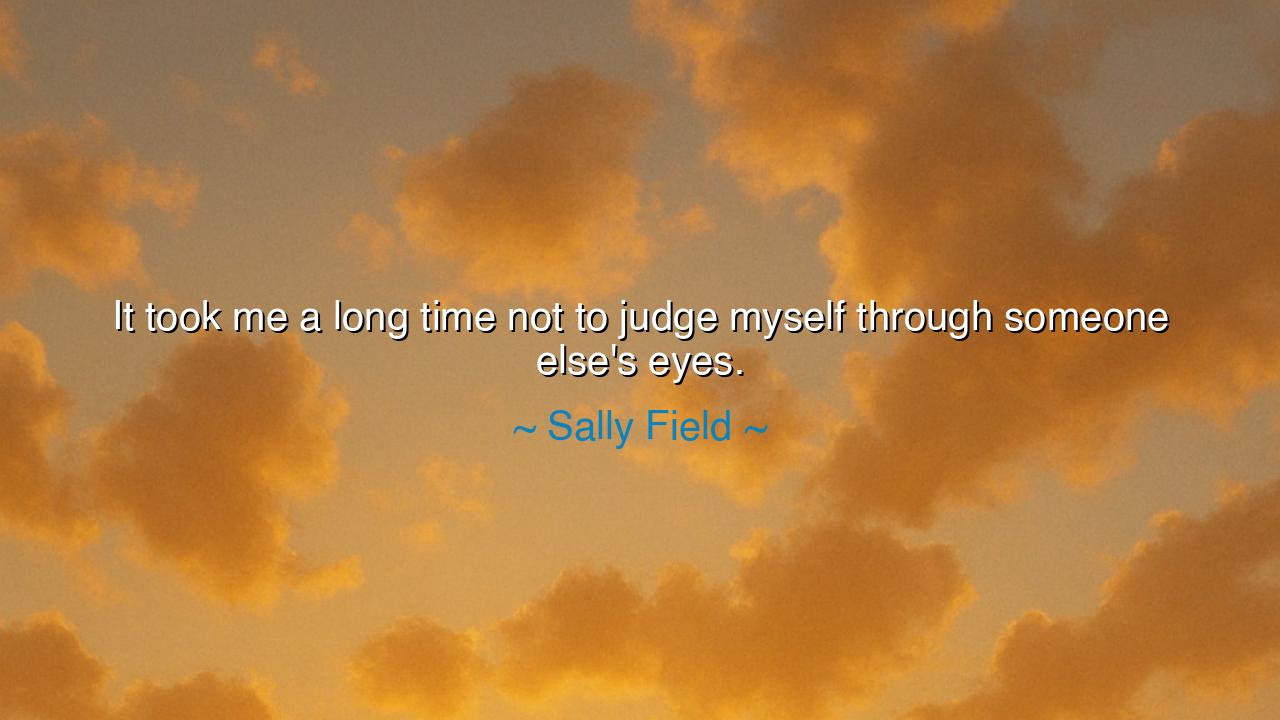
It took me a long time not to judge myself through someone






The artist of great sensitivity and courage, Sally Field, once confessed: “It took me a long time not to judge myself through someone else’s eyes.” These words, though born of her own journey in the realm of fame and art, carry the weight of an ancient struggle. They reveal the hidden chains that bind countless souls: the burden of measuring one’s worth by the gaze of others, the endless thirst for approval that blinds us to our own truth. Hers is a cry both personal and universal, a reminder that freedom is not only liberation from tyrants without, but from the tyrant of judgment within.
To judge oneself through someone else’s eyes is to live as a shadow, ever shifting according to the light of others. The applause becomes food, and its absence becomes famine. The frown of another becomes condemnation, and the praise of another becomes salvation. But in such living, the soul forgets its own reflection. It no longer asks, Am I true? Am I whole? Instead, it asks, Am I pleasing? Am I accepted? This is a slavery more subtle than chains of iron, for it hides within the heart and gnaws at the spirit.
Yet the words of Field also reveal the path of liberation. She declares it took her a long time—for indeed, the journey is not swift. To cast off the false mirrors of others and behold oneself in the light of truth requires courage, patience, and pain. It is the path of learning to sit in silence with one’s own soul, to hear its voice apart from the clamor of the world. And when that moment comes, when a person learns to judge themselves not by borrowed eyes but by their own heart, they rise into a strength unshakable.
History offers us a great example in the life of Galileo Galilei. Surrounded by powerful voices that condemned his discoveries, he was told that to claim the earth moved was heresy. Had he judged himself by the eyes of others, he would have silenced his mind and buried the truth. Yet though he suffered condemnation, he knew within himself that his work was true. And so he endured, bearing the judgment of others but refusing to let their gaze redefine who he was. His life teaches us, as Field’s words echo, that the eye of truth within is worth more than a thousand eyes without.
The meaning of this wisdom is profound: that self-worth must not be borrowed. To live fully, one must see with their own eyes, measure with their own spirit, and know with their own heart. The eyes of others are fickle, easily clouded by envy, prejudice, or misunderstanding. But the soul’s own vision, if kept honest and clear, is steady and true.
The lesson for us is this: cease the endless labor of pleasing. Do not live your life as an actor upon a stage, ever waiting for applause. Live as the author of your own script, the builder of your own temple, the singer of your own song. Listen to wise counsel, yes, but do not let the chorus of others drown the quiet voice of your own truth. For it is only in that voice that you will find peace.
Practical action lies in reflection and practice. Each day, ask yourself: Am I doing this from conviction, or from fear of judgment? Write your victories and failures, not as others see them, but as your heart knows them. Practice moments of solitude, where the gaze of others cannot reach you, and let your soul speak freely. Over time, you will find that the chains of false eyes fall away, and you will stand upright, clothed not in borrowed approval, but in the dignity of your own being.
Thus, O seekers of truth, carry Sally Field’s wisdom into your lives: it may take you a long time, but when you learn not to judge yourself through the eyes of others, you will awaken to freedom. And in that freedom, your worth will no longer be a flickering flame at the mercy of the wind, but a steady fire that burns from within, illuminating your path and warming all who draw near.






AAdministratorAdministrator
Welcome, honored guests. Please leave a comment, we will respond soon